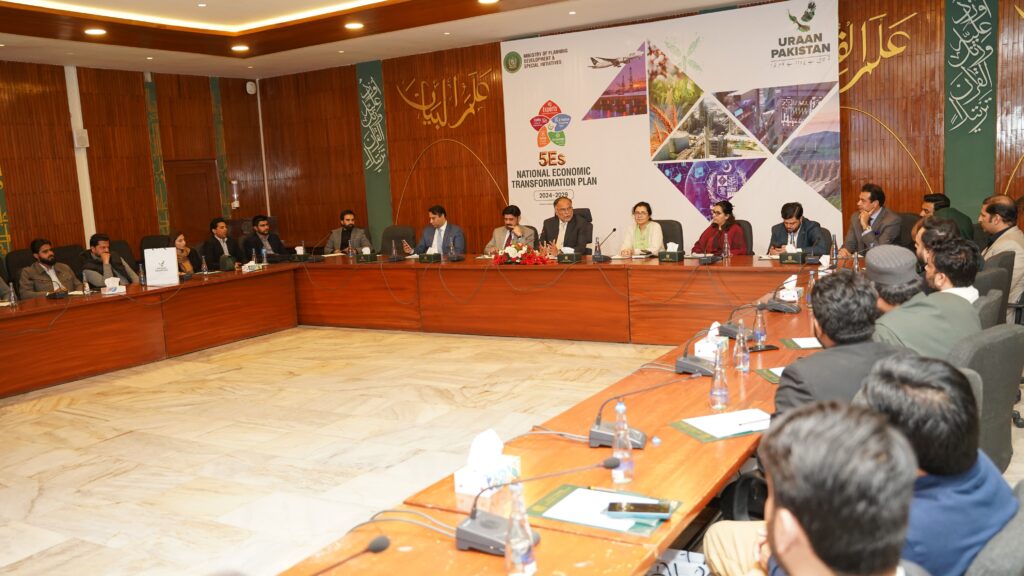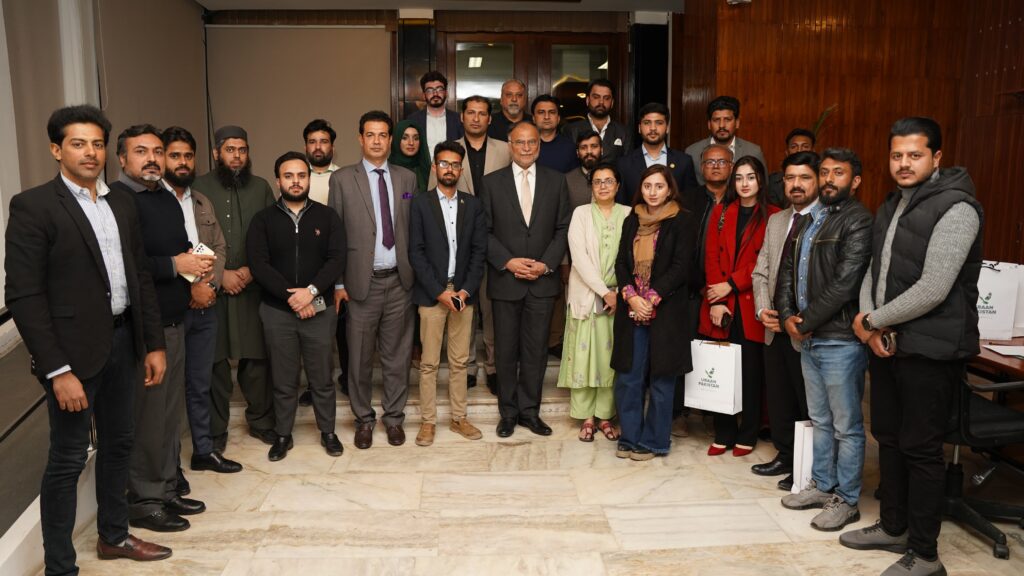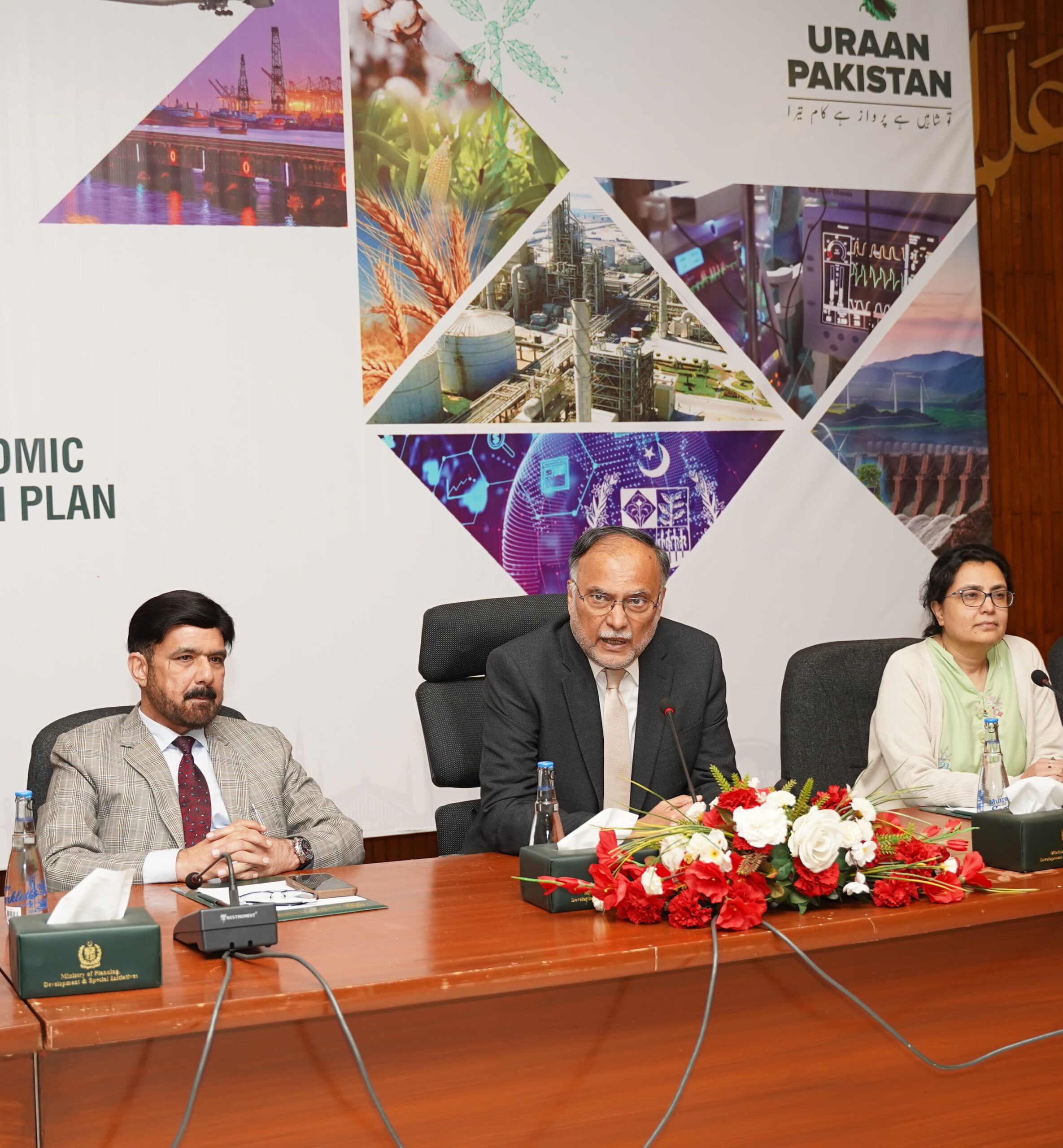In a dynamic and thought-provoking session, Planning Minister Prof. Ahsan Iqbal Chaudhary met with bloggers, vloggers, and digital content creators to discuss the government’s vision for Pakistan’s economic transformation and the role of digital media in addressing societal challenges. The session underscored the importance of digital platforms in shaping national narratives, fostering unity, and driving sustainable development.
Prof. Iqbal emphasized the transformative power of digital media in today’s interconnected world, describing it as a modern battleground for ideas and narratives. He likened social media to a “knife,” capable of saving lives through constructive use or causing harm through misuse. The minister urged Pakistan’s digital influencers to harness the potential of social media for positive change, countering polarization and promoting national cohesion.

Mr. Ahsan Iqbal Addresses Digital Media Influencers
Addressing Polarization and Identity Politics
Prof. Iqbal highlighted the global rise of polarization fueled by identity politics, noting how micro-media platforms amplify targeted messages that often deepen societal divides. “Every society today faces the challenge of polarization,” he said, stressing the need for social cohesion to ensure progress. In Pakistan, he lamented the persistence of negative narratives that have historically undermined trust in institutions and eroded national unity. He called for a shift away from divisive rhetoric and toward narratives that build confidence and pride in the nation.
Must Read: Bilawal Zardari Proposes Pakistan as Mediator Between US and China
Economic Challenges and the Path to Reform
The minister outlined Pakistan’s economic challenges, emphasizing the critical role of political stability, policy continuity, and structural reforms in achieving sustainable growth. Drawing lessons from countries like China, India, Malaysia, and Turkey, he highlighted how long-term planning and stability have been key to their success. “Without political stability and policy continuity, no country can prosper,” he stated, pointing to Pakistan’s history of economic disruptions caused by political instability.
Prof. Iqbal reflected on the economic reforms of the 1990s under former Prime Minister Nawaz Sharif, which initially spurred growth but were derailed by political upheavals. He also recalled the progress made between 2013 and 2018 in energy, infrastructure, and security, which was later reversed due to policy disruptions. The minister urged stakeholders to learn from these experiences and focus on long-term, sustainable development.
Vision 2047: A Roadmap for Pakistan’s Centennial
Looking ahead, Prof. Iqbal presented the government’s ambitious vision for Pakistan’s centennial in 2047. He envisioned a Pakistan with a $3 trillion economy, achieved through consistent reforms and a growth rate of 9%. He outlined two potential scenarios: one where Pakistan embraces reforms and becomes a thriving economy, and another where stagnation prevails due to a lack of action. “By 2047, Pakistan can be a global success story if we commit to the right reforms and work together,” he asserted.
The Uraan Pakistan Initiative
Prof. Iqbal introduced the “Uraan Pakistan” initiative, a comprehensive development framework designed to address Pakistan’s key challenges. The initiative focuses on five pillars:
- Export Growth: Boosting exports to $60 billion over the next five years by promoting IT, manufacturing, agriculture, and creative industries.
- Digital Economy: Empowering Pakistan’s youth by enhancing the freelancing industry, providing skills training, and integrating technology into the economy.
- Climate Resilience: Addressing food and water security, promoting smart agriculture, and investing in renewable energy to combat climate change.
- Energy and Infrastructure: Improving energy efficiency, expanding green energy projects, and enhancing regional connectivity.
- Social Equity: Increasing women’s workforce participation from 23% to 50% and providing education and skills training to youth.
The minister also highlighted a $67 billion project to eradicate Hepatitis C within three years, showcasing the government’s commitment to public health.
The Role of Digital Influencers
Prof. Iqbal called on digital influencers to play a pivotal role in reshaping Pakistan’s narrative. He urged them to counter negative perceptions and highlight the country’s achievements on global platforms. “We are not worse than others, nor are we perfect. But we must project a positive image of Pakistan to the world,” he said. He criticized the misuse of social media for spreading hatred and division, sharing personal anecdotes to illustrate its harmful effects. The minister emphasized the need to foster a positive national identity, particularly among youth, who make up 60% of the population.

Group Photo of Digital and Social Media Influencers with Minister Planning Prof. Ahsan Iqbal
Leveraging International Opportunities
The minister highlighted efforts to rebuild trust with international investors and allies. He pointed to the second phase of the China-Pakistan Economic Corridor (CPEC) as a transformative opportunity, with a focus on innovation, green development, and industrialization. He also noted renewed interest from Gulf countries, with potential investments of $10 billion, contingent on viable project proposals.
A Call for Unity and Collective Action
In his concluding remarks, Prof. Iqbal urged Pakistanis to set aside political differences and work together for the nation’s progress. He warned against the long-term damage caused by internal divisions and negative narratives, stressing the importance of unity and mutual respect. “We must focus on building a Pakistan that future generations can be proud of,” he said.
The session ended with a call to action, as Prof. Iqbal encouraged the digital community to actively contribute to shaping a brighter, more prosperous future for Pakistan. By leveraging the power of digital media, he believes Pakistan can overcome its challenges and achieve its vision of national revival.



